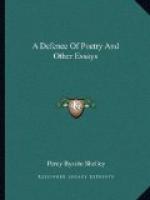It is a decision against which all our persuasions struggle, and we must be long convicted before we can be convinced that the solid universe of external things is ’such stuff as dreams are made of.’ The shocking absurdities of the popular philosophy of mind and matter, its fatal consequences in morals, and their violent dogmatism concerning the source of all things, had early conducted me to materialism. This materialism is a seducing system to young and superficial minds. It allows its disciples to talk, and dispenses them from thinking. But I was discontented with such a view of things as it afforded; man is a being of high aspirations, ’looking both before and after,’ whose ‘thoughts wander through eternity,’ disclaiming alliance with transience and decay; incapable of imagining to himself annihilation; existing but in the future and the past; being, not what he is, but what he has been and shall be. Whatever may be his true and final destination, there is a spirit within him at enmity with nothingness and dissolution. This is the character of all life and being. Each is at once the centre and the circumference; the point to which all things are referred, and the line in which all things are contained. Such contemplations as these, materialism and the popular philosophy of mind and matter alike forbid; they are only consistent with the intellectual system.
It is absurd to enter into a long recapitulation of arguments sufficiently familiar to those inquiring minds, whom alone a writer on abstruse subjects can be conceived to address. Perhaps the most clear and vigorous statement of the intellectual system is to be found in Sir William Drummond’s Academical Questions.
After such an exposition, it would be idle to translate into other words what could only lose its energy and fitness by the change. Examined point by point, and word by word, the most discriminating intellects have been able to discern no train of thoughts in the process of reasoning, which does not conduct inevitably to the conclusion which has been stated.
What follows from the admission? It establishes no new truth, it gives us no additional insight into our hidden nature, neither its action nor itself. Philosophy, impatient as it may be to build, has much work yet remaining, as pioneer for the overgrowth of ages. It makes one step towards this object; it destroys error, and the roots of error. It leaves, what it is too often the duty of the reformer in political and ethical questions to leave, a vacancy. It reduces the mind to that freedom in which it would have acted, but for the misuse of words and signs, the instruments of its own creation. By signs, I would be understood in a wide sense, including what is properly meant by that term, and what I peculiarly mean. In this latter sense, almost all familiar objects are signs, standing, not for themselves, but for others, in their capacity of suggesting one thought which shall lead to a train of thoughts. Our whole life is thus an education of error.




